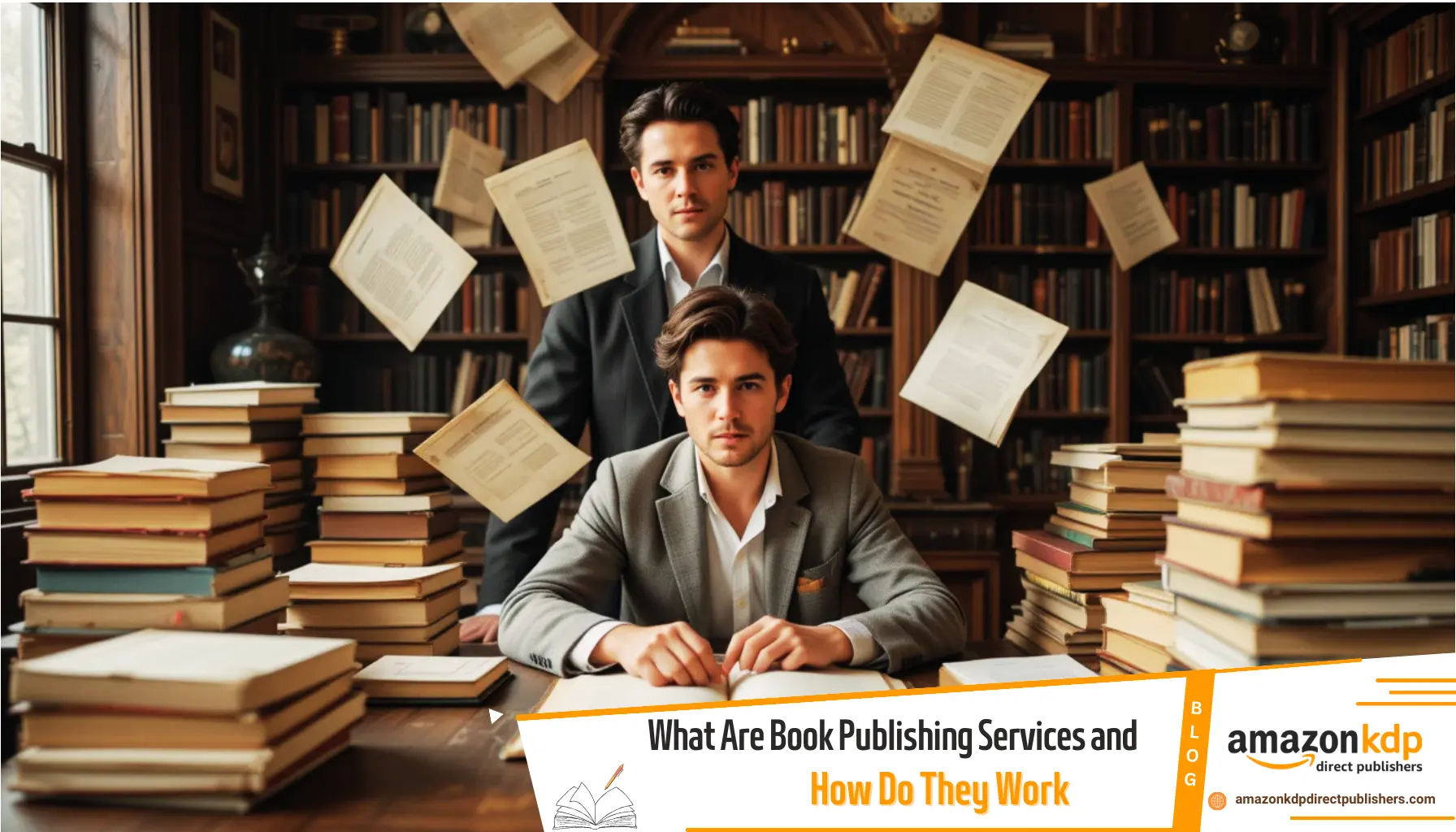A Guide to Professional Book Publishing Services
Book publishing services are professional offerings that help transform your manuscript into a fully polished book that’s ready to hit the market. These services include everything from editing and cover design to formatting, marketing, and distribution. The goal? To make your book appealing, accessible, and sellable. Whether you’re going the traditional publishing route or considering self-publishing, understanding these services is crucial to making the right decision for your goals and budget.
Understanding the Scope of Book Publishing Services
When we talk about book publishing services, we’re not just referring to printing. We’re looking at a full suite of professional support—editing, proofreading, layout design, cover design, ISBN assignment, formatting for eBooks and print, marketing strategies, and distribution to online and physical retailers.
At the heart of it, publishing services are there to elevate the quality of your manuscript and give it a professional edge. You can think of these services like a production team in a movie studio—they handle all the behind-the-scenes work so your book can shine on center stage.
Some authors want help with everything, while others may only need assistance with specific parts of the process. The good news? There’s a publishing model that fits every kind of writer.
Traditional Publishing: How It Works and Who It’s For
In traditional publishing, authors typically submit their manuscripts to agents or publishers. If accepted, the publisher takes on all the heavy lifting—from editing to printing to marketing—at no cost to the author. Instead of paying upfront, you earn royalties on sales.
This path is perfect if:
- You want credibility and access to a large distribution network.
- You’re not looking to invest upfront.
- You’re okay with giving up some creative control.
However, the competition is stiff. Publishers receive thousands of submissions, and only a select few are accepted. Plus, even if you land a deal, the process can be slow, sometimes taking over a year before your book hits shelves.
What Publishers Handle in This Model:
- Editing & Proofreading: Professional editors refine your manuscript.
- Design: They’ll create a market-ready cover and interior layout.
- Printing & Distribution: Your book gets into major retailers and bookstores.
- Marketing: They might offer promotional campaigns or author tours.
But here’s the catch: you don’t have the final say on everything. Your title, cover design, and even edits might be out of your hands.
Self-Publishing Services: Maximum Control, Maximum Responsibility
It’s possible to self-publish on your own, but that doesn’t mean you have to do it alone. Using self-publishing services, you can hire experts at every stage-editing, design, and marketing-while maintaining full ownership and control.
This is ideal if:
- You want creative control and full rights to your book.
- You’re willing to invest money upfront.
- You’re ready to take on the role of both author and publisher.
Services You Might Need in Self-Publishing:
- Developmental Editing: Big-picture feedback on plot, pacing, and structure.
- Copyediting & Proofreading: Fix grammar, spelling, and punctuation.
- Cover & Interior Design: Eye-catching visuals tailored to your genre.
- Formatting: Ensuring your book is ready for Kindle, print, or both.
- Distribution: Uploading your book to platforms like Amazon KDP, IngramSpark, or Draft2Digital.
- Marketing Support: From email campaigns to social media ads and book trailers.
Many self-publishing platforms (like Amazon KDP) offer basic tools, but outsourcing to professionals can make the difference between a book that sells and one that sinks.
Hybrid Publishing: The Best of Both Worlds?
Hybrid publishing blends elements of traditional and self-publishing. Here, you pay for certain services upfront, but in return, you get professional support similar to what a traditional publisher would offer.
Choose this path if:
- You want a professionally published book without losing your rights.
- You’re okay with investing upfront but don’t want to manage every detail.
- You’re looking for a faster turnaround than traditional publishing offers.
How Hybrid Publishers Work:
- You fund the production but get expert help throughout the publishing process.
- Royalties are often more favorable than traditional publishing.
- You retain more control compared to traditional deals.
But beware: the hybrid space is full of predatory vanity publishers that charge sky-high fees for mediocre results. Always research a hybrid publisher’s track record before signing a contract.
Key Differences Between Traditional, Hybrid, and Self-Publishing Services
Choosing between traditional, hybrid, and self-publishing services depends on your goals, budget, and desired level of control. Understanding the differences can help you make the right decision for your book’s success.
Traditional Publishing
- Cost: No upfront cost to the author.
- Control: Limited creative control; publisher makes most decisions.
- Royalties: Lower (typically 5–15%) but no investment from the author.
- Timeline: Lengthy submission and publication process.
- Distribution: Wide, includes bookstores and libraries.
Self-Publishing
- Cost: Author pays for services.
- Control: Full control over design, content, and marketing.
- Royalties: Higher (up to 70–100% depending on platform).
- Timeline: Faster to market.
- Distribution: Online platforms mainly, with limited physical bookstore access unless managed independently.
Hybrid Publishing
- Cost: Author pays upfront for packages or specific services.
- Control: Moderate; author retains more rights.
- Royalties: Often 50% or more.
- Timeline: Faster than traditional.
- Distribution: Depends on publisher’s network; can include physical stores.
Understanding these core differences lets you weigh trade-offs. Traditional publishing offers prestige but less flexibility. Self-publishing gives you control but requires work and investment. Hybrid models try to balance both—but require careful vetting.
How to Choose the Right Book Publishing Service for Your Needs
Not every author has the same needs, which means the right publishing route varies. Ask yourself some key questions:
- Do I want to be involved in every aspect of publishing?
- Do I have the budget to invest in my book?
- Am I seeking wide distribution and industry validation?
- How fast do I want my book out there?
If you’re new to publishing and want hands-on experience, self-publishing is a great way to learn. If you’re aiming for literary awards or major bookstore placement, traditional publishing might be your goal. Hybrid publishing offers a smoother learning curve with pro-level support—perfect for busy professionals.
Tips for Choosing a Publishing Service Provider
- Check reviews and testimonials.
- Review their past work or portfolio.
- Understand their pricing structure—what’s included?
- Ask about royalties, rights, and contracts.
- Avoid companies that guarantee bestsellers or use high-pressure sales tactics.
In the end, it’s all about aligning the publishing model with your personal vision and practical expectations.
What to Expect from a Full-Service Book Publishing Company
A full-service book publishing company is your one-stop shop. They offer an end-to-end publishing solution, handling everything from manuscript polishing to marketing. This is ideal if you want quality and convenience without managing every detail.
Common Services Offered:
- Manuscript Evaluation: Feedback on structure, tone, and marketability.
- Editing Services: From developmental to line editing and proofreading.
- Design Services: Custom covers, typesetting, layout, and graphics.
- Publishing Platforms: Formatting for Kindle, paperback, hardcover, and more.
- Distribution: Get your book into Amazon, Barnes & Noble, Apple Books, and more.
- Marketing & PR: Author websites, press releases, book trailers, launch campaigns.
You’ll typically get a project manager who keeps things on track. This reduces stress and lets you focus on your next big idea.
However, not all full-service publishers are created equal. Always compare packages and talk to multiple providers before committing.
The Cost of Book Publishing Services: What You Need to Know
Book publishing services can vary wildly in cost depending on which route you take and which services you choose. Here’s a breakdown of typical costs in self and hybrid publishing:
| Service | Estimated Cost |
| Manuscript Evaluation | $200 – $500 |
| Developmental Editing | $1,000 – $3,000+ |
| Copyediting & Proofreading | $500 – $1,500 |
| Cover Design | $300 – $800 |
| Interior Formatting | $200 – $600 |
| eBook Conversion | $100 – $300 |
| ISBN & Copyright | $100 – $150 |
| Marketing Packages | $500 – $5,000+ |
While traditional publishing covers all these costs, self and hybrid authors need to budget for them. And remember—cutting corners on quality can hurt your book’s credibility and sales.
Look for bundles or publishing packages that provide good value. Sometimes paying a bit more upfront saves you a lot of headaches (and revisions) later.
Editing and Proofreading: The Heart of Quality Book Publishing Services
You’ve poured your heart into writing your manuscript, but even the best writers need a second set of eyes—or two. Editing and proofreading are the backbone of professional book publishing services. They ensure your book is not just readable but polished, engaging, and error-free.
Types of Editing Services
- Developmental Editing
Focuses on structure, plot flow, character development, and pacing. This is especially crucial for fiction writers. - Line Editing
Looks at sentence structure, tone, and style. A line editor helps refine your voice without changing the essence of your story. - Copyediting
Targets grammar, punctuation, spelling, and sentence clarity. This makes your writing clean and consistent. - Proofreading
This is the final polish—checking for minor errors, typos, or formatting glitches before publication.
Think of editing as grooming your book for the red carpet. If it’s riddled with inconsistencies or clunky phrasing, readers won’t stick around. And trust me, a great editor can turn a good book into a bestseller.
Why You Shouldn’t Skip This Step
Self-editing is valuable, but professional editors bring objectivity and expertise. Even best-selling authors go through rounds of edits. So, if you want your book to stand out, don’t underestimate the value of great editing.
Book Cover Design and Interior Formatting: Judging a Book by Its Cover
Yes, people absolutely judge a book by its cover—and so should you. Your book cover is your first impression. It’s what convinces a reader to click, pick up, or scroll past your book.
What Makes a Great Book Cover?
- Genre-appropriate imagery
- Clear, bold title fonts
- Author name visibility
- Professional design balance and composition
Whether you’re writing a romance, thriller, or business guide, your cover must speak your audience’s language. Investing in a custom design can make a massive difference in sales.
Interior Formatting Matters Too
Once a reader opens your book, the layout should look clean, modern, and easy to read. Good formatting:
- Uses proper margins and font sizes
- Breaks up chapters with headers
- Includes page numbers, footers, and images when needed
- Ensures eBooks render properly on all devices
Even something as small as a font change can influence how professional your book feels. A poorly formatted book screams amateur, no matter how brilliant the content is.
Marketing and Distribution: Getting Your Book Into Readers’ Hands
Publishing your book is only half the journey. The real challenge? Getting people to read it. That’s where marketing and distribution services come in.
Marketing Strategies Offered by Publishing Services
- Press releases and media outreach
- Author websites and branding
- Social media marketing
- Email newsletters
- Book trailers and influencer outreach
- Amazon Ads and Goodreads promotions
If you’re self-publishing, these are essential. A marketing-savvy publisher can help your book reach the right eyes—whether that’s online shoppers, bookstores, or libraries.
Distribution Options
Most book publishing services will help distribute your book through:
- Amazon (KDP)
- Barnes & Noble Press
- Apple Books
- IngramSpark
- Kobo and other eBook retailers
You can also opt for print-on-demand (POD) or bulk printing, depending on your launch strategy. A good distribution plan ensures your book is available where your readers are.
Pro Tip:
Always ask your publishing service for a detailed marketing plan. Some companies just list your book online and call it “distribution.” You need more than that—targeted promotion is key.
Common Mistakes to Avoid When Choosing Book Publishing Services
Let’s be real—there are a lot of shady “publishing” services out there. Authors have been burned by vanity publishers, hidden fees, and contracts that steal their rights. Avoiding these traps is critical.
Red Flags to Watch For
- They guarantee bestsellers. No one can promise that.
- They ask for huge upfront fees without clarity.
- They retain full rights to your work.
- They have vague or generic service packages.
- Poor communication and slow responses.
Smart Moves
- Read reviews and ask for author referrals.
- Request a clear, itemized quote.
- Always read contracts carefully (better yet, have a lawyer review them).
- Compare multiple service providers before choosing one.
It’s your book, your voice, and your career. Make sure whoever you work with respects that and treats your work like the masterpiece it is.
Top Book Publishing Services to Consider in 2025
If you’re ready to publish your book but aren’t sure which publishing company to trust, don’t worry—we’ve got you covered. Here’s a curated list of some top-rated book publishing services to consider in 2025, based on credibility, service range, and author reviews.
1. Amazon Kindle Direct Publishing (KDP)
- Best for: Self-publishing authors seeking a global audience
- Why it’s popular: Easy to use, no upfront costs, 70% royalties on eBooks
- Services: eBook and print publishing, global distribution
2. IngramSpark
- Best for: Authors who want wide print distribution (bookstores, libraries)
- Why it’s popular: Offers access to thousands of retailers and print-on-demand
- Services: Print & eBook formatting, distribution, bulk printing options
3. Reedsy
- Best for: Hiring freelance experts (editors, designers, marketers)
- Why it’s popular: Quality professionals with verified portfolios
- Services: All publishing services available à la carte
4. BookBaby
- Best for: All-in-one packages with high-quality design
- Why it’s popular: Offers editing, design, and marketing bundles
- Services: Cover design, editing, formatting, distribution, marketing
5. Gatekeeper Press
- Best for: Full-service self-publishing with high royalties
- Why it’s popular: 100% author royalties and rights
- Services: ISBN, editing, design, print & digital distribution
When selecting a provider, look for transparency, service variety, and responsiveness. Every author’s needs are different—choose the service that best aligns with your publishing goals and budget.
Should You Hire a Book Publishing Consultant?
Still unsure about which route to take or which services you need? Hiring a book publishing consultant might be a smart move. Consultants offer personalized guidance and help you:
- Define your publishing goals
- Select the right publishing model
- Vet publishers and services
- Manage timelines and costs
- Avoid scams or bad contracts
It’s like having a publishing GPS—someone who’s been there, done that, and can steer you around the pitfalls. For first-time authors or busy professionals, this can be a huge time-saver.
Cost of a Consultant
Depending on their experience and involvement, consultants can cost anywhere from $100/hour to a flat fee of $1,000–$3,000. Make sure to interview potential consultants, ask for references, and clarify expectations before signing a contract.
Final Thoughts: Choosing the Best Book Publishing Services for You

Book publishing is no longer a one-size-fits-all process. With so many publishing paths and service providers available, it’s easier than ever for authors to take control of their publishing journey. The key is to:
- Know your goals
- Set your budget
- Understand your audience
- Vet service providers thoroughly
Whether you’re dreaming of a traditional book deal or planning a self-publishing empire, there’s a publishing service out there that fits you like a glove. Just remember—this is your story. Make sure it’s told the way you want it.
FAQs
1. What’s the difference between self-publishing and vanity publishing?
Vanity publishers charge authors high fees without offering real value or transparent services. Self-publishing allows you to hire professionals as needed and keep control over your work and royalties.
2. Do I need to buy an ISBN when self-publishing?
Yes, an ISBN is essential for distribution. Some platforms (like Amazon KDP) offer free ones, but if you want full ownership, consider buying your own from Bowker (in the U.S.).
3. How long does the publishing process take?
It varies. Traditional publishing can take 12–24 months, while self-publishing can be done in a few weeks if your manuscript is ready and services are lined up.
4. Can I publish my book on multiple platforms?
Absolutely. Many authors publish through Amazon KDP and also use IngramSpark for wider print distribution. Just be cautious about exclusivity clauses.
5. What is the most cost-effective way to publish a book?
Self-publishing is generally the most cost-effective—especially if you DIY certain aspects—but always invest in professional editing and design for a polished result.






